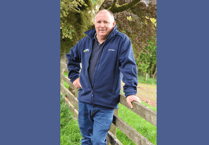August is going to remain a busy month for our teams across Wales as county shows continue to provide opportunities for us to meet with members, stakeholders and politicians.
A topic that we have been discussing with members and politicians continuously for some time are the Water Resources (Control of Agricultural Pollution) (Wales) ‘NVZ’ regulations. Those who were at the Royal Welsh Show on the Monday will have had the opportunity to hear a panel of experts discuss the ins and outs of those regulations in some detail.
We are all too clear that the ‘NVZ’ regulations are having an impact on all farmers across Wales in one way or another. As such, the aim of the seminar was to provide a platform for members to come and hear where we are with the regulations and representatives from ADAS and Kebek explained what farmers need to do to comply with the requirements.
Despite the fact that the regulations are now in the statutory book, we continue to focus our lobbying efforts on amendments and on ways in which the regulations could be made more workable for farmers.
This includes work relating to the proposed licensing scheme for increasing the whole farm nitrogen limit from livestock manures. In our response to the consultation earlier this year, we highlighted how the proposed scheme could act as a significant safety net for a number of farmers in Wales who are already above this limit as long as the criteria is fair and proportionate.
Nevertheless, farmers who are attempting to invest into new infrastructure in order to comply with these regulations continue to face a number of challenges when it comes to finance, tenancies and planning. We have also highlighted that the Welsh Government should provide farmers with draft maps and pre-filled records to help with compliance and we expect an update on this in due course.
The Welsh Government recently set out a list of areas which they intend to take forward as part of the 4-year review and while most of them are points of clarity, they will also be considering taking some other proposals forward such as alternatives to the closed periods for spreading slurry.
While the Welsh Government is only required to review the effectiveness of the regulations as a means of reducing or preventing water pollution from agricultural sources every four years, EU NVZ regulations differ in that Member States must also take into account the impact on agricultural practices amongst other considerations.
The FUW is fully aware of the complexities of the regulations and the spreadsheet template is complicated. We would encourage those who are having difficulties to speak to their county office who will help with sign-posting members to the right support and available information.
Infrastructure is also a concern. We are not just aware of but have also highlighted these concerns many times in our conversations and engagement with the Welsh Government. The overall advice is that farmers need to ensure that they calculate the size of a required slurry store correctly, taking rainwater and freeboards into account. Farmers have also been advised not to start building until planning permission has been granted.
More information on this will be available to members in due course and we encourage those who are expecting a visit from an inspector to work with them and find a way to be compliant.



